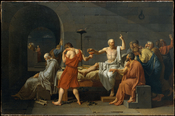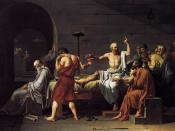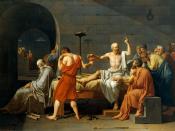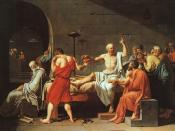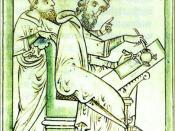Socrates' Acceptance of Death: Right or Wrong? Socrates believed in the immortality of the soul and that no one committed wrong willingly, but only because he had been mistaken on the true nature of right. So whether he did right or wrong, he believed himself to be innocent. And if he did commit wrong, he did not do so consciously. However, the courts decided that he was guilty. And for Socrates, any avoidance of the price of truth telling would have been a denial of the told truth. Any kind of escape or evading of his penalty would have meant disavowing who he had been and what he had been saying. Had he been a judge, he would have been a just judge, and would have found himself innocent (as he showed when they asked him to suggest a penalty). But once the unjust verdict had fallen, it was not his role to prevent its being executed.
Socrates believed that it was better to submit than to commit injustice. So any kind of escape would be an injustice to the court that had found him guilty and in turn an untruthful act.
Now whether Socrates' decision to not avoid the verdict that is obviously undeserved was a smart choice or not depends on the reader. I for one, find it to be a very noble death. A sort of "do as you preach"� conclusion to a great philosopher's life. If Socrates were to escape his penalty, it would contradict the ethics that he "taught"�. Although his colleagues highly recommended his flight from prison, Socrates knew himself that it would be untruthful. Socrates' death is very gracious in this respect. Now whether his death occurred as depicted in Jacques-Louis David's painting is somewhat implausible, but a good example nonetheless of how noble his death was. The great philosopher, bare-chested and muscular, leaving the world, as he stated in the dialogues, continuing to practice philosophy "as long as I draw breath and am able."� Accepting his fate in a glass of hemlock from one of his students as they watch on with distress while Plato sits at the end of the bed with his head down in misery for his teacher is no more; all in all, a very dignified death. Of course, this is all based upon the accounts of only two men. So how much truth there is to it, no one will know.
